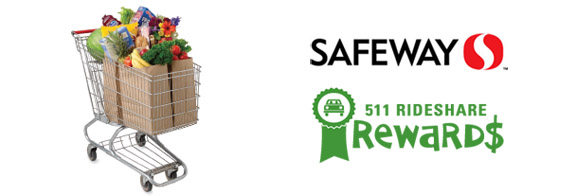With retail gasoline prices hitting $3 a gallon statewide, the 511 Regional Rideshare Program is joining forces with Safeway to kick off an incentive campaign for commuters who share the ride to work.

Published: June, 2006
Safeway Gift Card and Gas Card Incentive Arrives as Pump Prices Surge
With retail gasoline prices hitting $3 a gallon statewide, the 511 Regional Rideshare Program is joining forces with Safeway to kick off an incentive campaign for commuters who share the ride to work. The Rideshare Rewards program awards up to $100 in gas or Safeway gift cards to solo drivers who join carpools over the next two months.
We’re delighted to have Safeway, one of the largest grocery store retailers in North America, as a corporate sponsor for our new Rideshare Rewards program, said Tad Widby, project manager for 511 Rideshare. We share the same goal of pursuing a cleaner, less-congested environment.
Widby said the timing of the new incentive program couldn’t be more promising as retail gas prices continue to surge throughout the state. Gasoline prices are hovering at $3 a gallon, with experts predicting little relief later this summer. Rideshare Rewards gives new carpoolers a way to fight pain at the pump and ease the impact on the pocketbook.
As a major business in the region, we want to make sure we offer a significant percentage of our resources to help support the communities we serve, said Jennifer Webber, Public Affairs director for Safeway’s Northern California Division. Safeway is committed to making life a bit easier for busy families and individuals. A faster, less-stressful commute goes a long way toward that goal.
Pleasanton-based Safeway is contributing retail value cards good at any Safeway store. New carpoolers can earn $10 in gas or grocery gift cards for every five days they carpool, up to $100 within a three-month period. At the end of the year, 511 Rideshare will hold a drawing to award $1,000 to a lucky commuter who has carpooled at least 40 days during the program.
511 Rideshare has earmarked $50,000 to fund the rewards campaign, which officially got under way May 1. Commuters have until July 31, 2006, to sign up.
Once they sign up, they have three months to participate (in other words, a commuter signing up on July 31 would have until Oct. 31 to log carpool rides). The amount budgeted will cover at least the first 500 drivers who participate. The reward cards will be distributed first come, first served until funds run out.
Shelia Young, the mayor of San Leandro who also represents Alameda County on the Metropolitan Transportation Commission (MTC), said easing congestion would benefit the region’s economy. We must reduce rush hour traffic to help the region attract new businesses and retain existing ones, said Young, who participated in the press conference announcing the promotion. In addition, drawn-out, stressful commutes can lower job satisfaction and worker productivity.
MTC sponsors the 511 Rideshare program, which has caught the public’s attention. Just two weeks after the program launch, 127 commuters had already registered for it.
The special promotion was just the extra push that Elaine Chang needed to form a carpool. The Fremont resident has teamed up with a coworker to commute across the Bay to their jobs at a law firm in Palo Alto.
Even before [we heard of the program] we were thinking about riding together. We always talked about it, but didn’t act on it. The rewards program sped things up, she said, noting that she and her carpool mate take turns driving.
The biggest impact has been on her pocketbook. Not only is Chang reducing her gasoline bills, she’s also avoiding the $3 toll on the Dumbarton Bridge, since carpools of two or more pass free on that span. She calculates that by carpooling twice a week, she will save about $43 a month on gas and tolls, and she expects to earn another $10 a month through Rideshare Rewards, for a total of $53 a month in savings and bonuses during the promotion.
Michael Cunningham, the Bay Area Council’s vice president for transportation, said the Rideshare Rewards program is modest but essential. He noted that 35 percent of the 600 residents surveyed for the 2006 Bay Area Council Poll said traffic congestion is the most important hurdle facing the nine-county region.
Transportation has been the No. 1 concern for most of the 20 years we’ve published the poll, said Cunningham. We need to tackle the region’s transportation woes to create a robust business climate.
Widby said 511 Rideshare’s efforts to convince commuters to carpool are picking up speed. Registration at the Web site during the first quarter of 2006 was up nearly 20 percent compared to a year ago. In April alone, 1,548 new applicants signed up for ridesharing, a 43 percent jump from March.
To learn more about 511 Rideshare Rewards, go to 511.org and click Rideshare, or call 511 and say Rideshare.
511 Rideshare, like all the travel information on MTC’s popular 511 phone and Web system, is a free service.
511 Rideshare also runs an ongoing vanpool incentive program that rewards commuters with $300 to $900 for starting and operating vanpools.
511 Rideshare is funded by grants from the Federal Highway Administration, U.S. Department of Transportation, MTC, the Bay Area Air Quality Management District and county congestion management agencies. It helps commuters find other drivers to carpool or vanpool together to work. Qualifying carpools can cross Bay Area toll bridges free of charge during commute hours, and those new to ridesharing may qualify for financial incentives or subsidies beyond the Rideshare Rewards bonuses.

